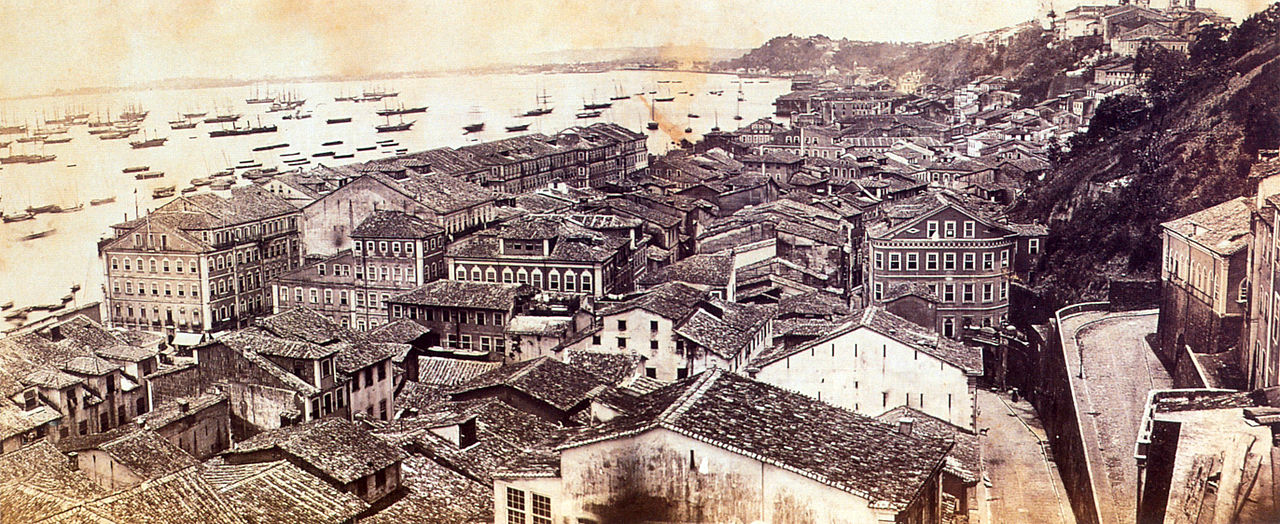27
On headed notepaper.
JOHN EGGERS
Caixa 114
Telegrammes
ATLANTIC-BAHIA.
Bahia, 13th Sept. 1890
My dear Mother,
8 a.m. – in the office – waiting for a blooming “Portuguese”, who promised solemnly to be punctual, & who is now probably drinking coffee & smoking cigarettes, oblivious of his appointment, reading the newspaper or settling the affairs of the Republic, with half a dozen patriots like himself, who – not holding any public office themselves – are fully convinced that the Government is made up of rogues & swindlers. Tomorrow he will tell me he was fearfully busy, had not a moment to spare, – infinitely distressed at having inconvenienced me, & so on & so on. At first this kind of thing used to irritate me, but now I take it calmly in my old age, having altered my way of looking at it with the “years that bring the philosophic mind”, as the poet says.[1]
São-Salvador-da-Bahia-de-todo-os-Santos is the name of this town, – that is what they call it “for short”, on week-days, – what its full Sunday name is I don’t know, I shall find out & learn it by heart when I have an hour or two to spare.[2] It is built in two storeys (the town, not the name of it) so to speak. By the way: my dictionary says stories – I thought it was -eys in this sense. There are about three streets parallel with the sea, on the lower level, behind which rises a steep bluff, almost a cliff, from a hundred to a hundred and fifty feet high – the rest of the town is on this higher level.
At one place there is a steep winding road cut in the face of this bluff, but it is little fancied by pedestrians, especially coming up, on account of the incline. There are two other ways of going from the lower to the higher town, or vice versa. One is by a steam elevator or hoist; as it carries you quickly up you look down through the narrow windows to the roofs of the houses at a dizzy distance below.[3] The other is a double line of railroad, at an angle of 45 degrees, with carriages drawn up & let down by a steel cable.
The view from the top is very fine: – the blue bay stretching out for many miles, the distant hills on the far side lost in mist, the green island at the mouth of the bay, & the shipping; – I have bought photographs both of Rio & of this place, but they do not give any just idea of the scene, the life & the colour that the bright sun gives are wanting.

I purpose going on to Pernambuco this week, & shall perhaps take the royal Mail “S.S. Magdalena” home. I believe she sails from Rio abt 6th prox. say 10th from Pernambuco, & abt. 24th in England, but I don’t know the exact dates.
At all events I shall write you many more letters.
Best love
Jack
16th Sept. per German Steamer “Argentina” via Lisbon.
- “years that bring the philosophic mind." From “Splendour in the grass” by William Wordsworth ↵
- Salvador (English: Savior), also known as São Salvador da Bahia de Todos os Santos (English: Holy Savior of the Bay of All Saints), is the capital of the Brazilian state of Bahia. ↵
- In 1873, Brazil's first elevator, the powerful hydraulic Elevador Lacerda, was constructed to connect the city's upper and lower towns. The Jesuits installed the first manual rope-and-pulley elevator around 1610 to transport goods and passengers from the port to the settlement. In 1868 an iron structure with clanking steam elevators was inaugurated, replaced by an electric system in 1928. https://en.wikipedia.org/wiki/Salvador,_Bahia and https://en.wikipedia.org/wiki/Elevador_Lacerda. ↵
